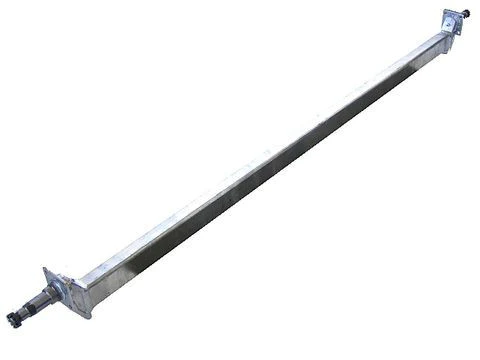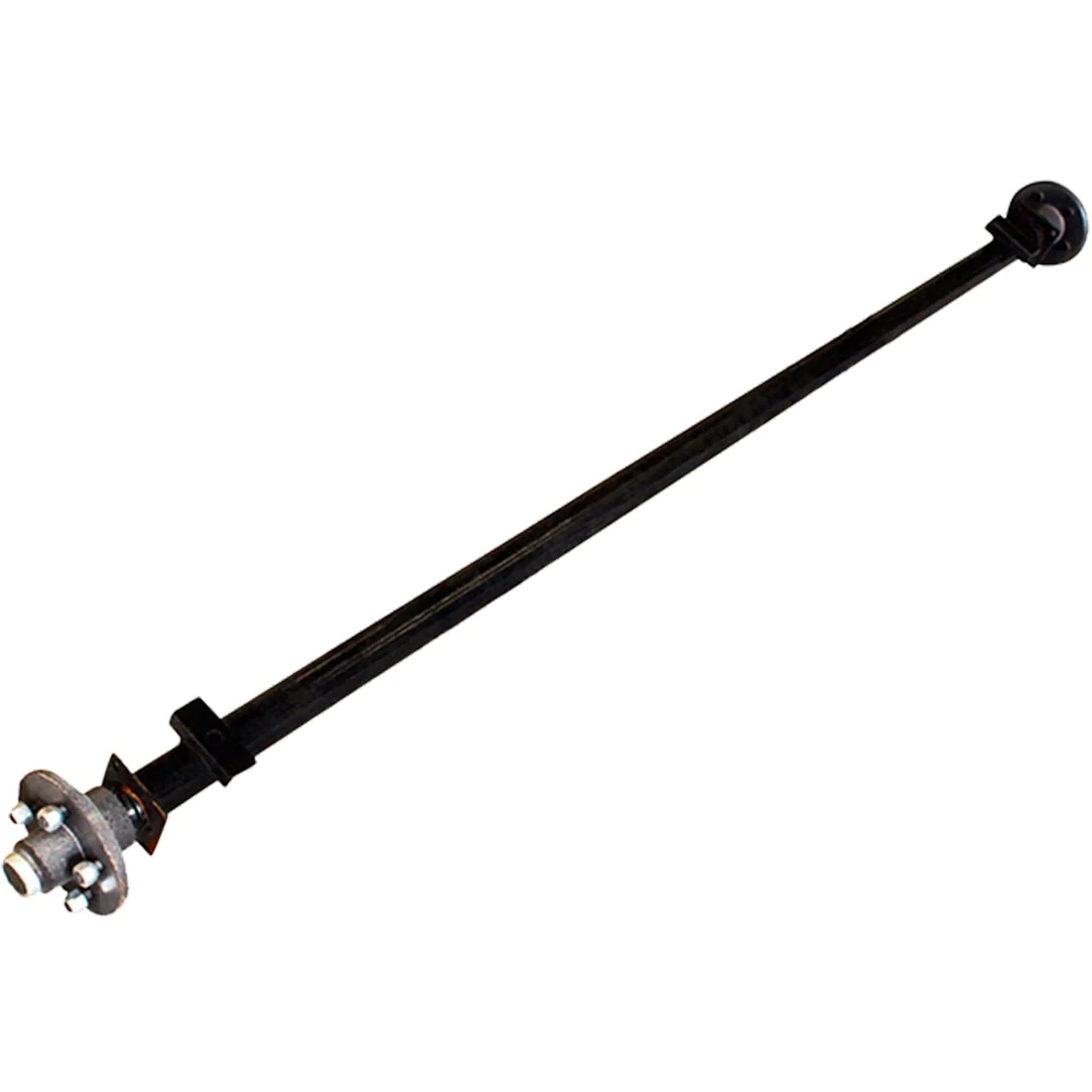Product Description
Product Parameters
1) 6″ Square Axle – 12mm, 14mm wall thickness.
2) Twin tyre steel wheel fixings are standard. ISO single wheel and twin tyre aluminum wheel fixings are also available.
3) Standard track length – 1840mm, other track lengths are also available.
4) All axles include standard manual slack adjuster, auto slack adjuster is optional.
5) Bearing size/type : 13 Tons Inner-HM518445/10 Outer-HM518445/10
16 Tons Inner HM220149/10 Outer- HM518445/10
6) All Axles are available with ABS ready Kits (Optional)
Detailed Photos
Company Profile
We are a group of professionals with decades of experience in the industry. We pooled our talents and knowledge together to form this manufacturing company to bring our experience to supply quality product to the market at competitive prices.
We have a strong technical team, with many years of practical experience and strong R&D team to bring unique designs and improvements to the market. We also supply customised solutions to suit niche markets.
We are internationally certified in our operations.
We have partnered with market leaders in supplying components since 2013.
We always believe in supporting our customers and have established regional after sales support channels
FAQ
1.Q: Are you a manufacturer?
A: Yes, we are a manufacturer located in ZheJiang province which in the manufacturing center of construction machinery. We have passed ISO and CE certificate and our products have been exported to over 20 countries.
2.Q: Why choose us?
A:With our 2 factories and more than 100 workers, we only produce very high quality products.2 Years warranty and only 1% repair rate during the past 10 years, which is cost effective and win good reputation.
3.Q: Can you produce customizable machines?
A: Yes, we can provide customizable machines according to your requirements. We have 8 senior engineers and can design and supply higher configuration.
4.Q: How about your After-sales service?
A: We have 3 after sales, and can provide 24-hour technical support by phone and email.
5.Q: What is your lead time?
A: Normal goods usually take 7-10 days, and customization takes 15-25 days
6.Q: Is it convenient to visit your factory? How to go there?
A: Warmly welcome to visit our factory. When you arrive, we will pick you up.
/* January 22, 2571 19:08:37 */!function(){function s(e,r){var a,o={};try{e&&e.split(“,”).forEach(function(e,t){e&&(a=e.match(/(.*?):(.*)$/))&&1
| After-sales Service: | Local After Service |
|---|---|
| Warranty: | One Year or 10,000km |
| Type: | Axle |
| Certification: | ISO/TS16949, ISO, CE |
| Loading Weight: | 16 Ton |
| ABS: | With ABS |
| Customization: |
Available
| Customized Request |
|---|

Are there specific challenges or maintenance practices for boat trailer axles?
Boat trailer axles come with unique challenges and maintenance requirements due to their exposure to marine environments. Here are some specific considerations:
- Corrosion: Exposure to saltwater can lead to accelerated corrosion. Regularly rinsing the axles, especially after launching, helps mitigate this issue. Additionally, choosing galvanized or aluminum axles provides better resistance to corrosion.
- Bearing Maintenance: Boat trailer axles often require more frequent bearing inspections and maintenance due to water exposure. Greasing the bearings before and after each trip is essential to prevent water intrusion and prolong bearing life.
- Seals and Gaskets: Ensure that seals and gaskets are in good condition to prevent water from entering the hubs. Replace them if they show signs of wear or damage.
- Proper Storage: Storing the boat trailer properly, preferably in a dry, covered area, can significantly extend the life of the axles and other components.
- Regular Inspections: Periodic inspections of the entire axle assembly, including brakes, hubs, and wiring, are crucial for early detection of issues that could lead to axle failure.
- Tire Maintenance: Proper tire care is essential. Check tire pressure, tread wear, and sidewall damage regularly, as underwater loading can stress trailer tires.
- Brake System Checks: Ensure that the brake system is functioning correctly, especially if the trailer has brakes. Saltwater exposure can affect brake components.
- Electrical System: Check and protect the electrical components to prevent corrosion and ensure that trailer lights and brakes work reliably.
- Spare Parts: Carrying spare parts such as bearings, seals, and a spare tire is a good practice, especially for longer trips where servicing might not be readily available.
Boat trailer axles demand diligence in maintenance to extend their lifespan and ensure safe and trouble-free trips. Prevention and early intervention are key to addressing the challenges posed by the marine environment.

How do brake systems and suspension components interact with trailer axles?
Brake systems and suspension components play a critical role in the overall functioning and safety of trailer axles. Their interaction ensures the trailer’s stability, handling, and stopping capabilities.
Brake Systems:
- Function: Brake systems in trailers provide the necessary stopping force when the towing vehicle applies its brakes. The brake system on the trailer axle needs to be synchronized with the towing vehicle for smooth and efficient stopping.
- Types: Trailers can be equipped with drum or disc brakes. Both systems rely on a controller from the towing vehicle, which applies the brakes in proportion to the towing vehicle’s deceleration.
- Interaction with Axles: The brake systems are mounted directly on the trailer axles. As the brakes apply friction to the rotating part of the axle (either the drum or disc), the axle experiences a counter force which helps in slowing down the trailer.
Suspension Components:
- Function: The suspension system on a trailer absorbs shocks and provides a cushioning effect, ensuring that the trailer remains stable over uneven terrains.
- Types: Common types of trailer suspension systems include leaf spring and air suspension systems. These systems are designed to distribute the trailer’s weight evenly across its axles.
- Interaction with Axles: Suspension components are directly connected to the trailer axles. They ensure the axles remain parallel to the ground, distributing weight and strain evenly. This not only aids in the longevity of the axle but also in the even wear of tires and brakes.
In summary, the brake systems and suspension components of a trailer are integral to its axles’ functionality and longevity. Proper maintenance and understanding of these systems are essential for safe and efficient trailer operation.

Are there different weight capacities for trailer axles depending on the trailer type?
Yes, trailer axles come in various weight capacities, and the capacity depends on the specific trailer type and its intended use. Here are some common weight capacities for different trailer types:
1. Utility Trailers:
– Utility trailers often have single axles with weight capacities ranging from 1,000 to 3,500 pounds. These trailers are used for light-duty hauling and general-purpose applications.
2. Boat Trailers:
– Boat trailers can vary widely in weight capacity based on the size of the boat they are designed to carry. Smaller boat trailers may have weight capacities of 3,000 to 5,000 pounds, while larger ones can exceed 10,000 pounds.
3. Enclosed Trailers:
– Enclosed trailers, used for transporting cargo, merchandise, or personal items, can have weight capacities from 2,000 to 12,000 pounds or more, depending on their size and construction.
4. Flatbed Trailers:
– Flatbed trailers are available in various weight capacities to accommodate different cargo loads. Common capacities include 7,000, 10,000, and 14,000 pounds, among others.
5. Dump Trailers:
– Dump trailers, designed for hauling materials like gravel or construction debris, may have weight capacities ranging from 5,000 to 20,000 pounds, or even higher for heavy-duty models.
6. Car Hauler Trailers:
– Car hauler trailers, used to transport vehicles, typically have weight capacities of 7,000 to 14,000 pounds, depending on the number of axles and the size of the trailer.
7. Gooseneck Trailers:
– Gooseneck trailers are heavy-duty and often used for transporting large equipment or livestock. Their weight capacities can range from 10,000 to 30,000 pounds or more.
8. Specialty Trailers:
– Specialty trailers, such as equipment trailers, horse trailers, and concession trailers, have weight capacities tailored to their specific purposes and design.
– It’s crucial to select a trailer with an axle and weight capacity that matches the intended load. Overloading a trailer can lead to safety risks, damage to the trailer, and legal issues. Manufacturers provide weight ratings and guidelines for each trailer type to help buyers choose the right option for their needs.


editor by CX 2024-04-23